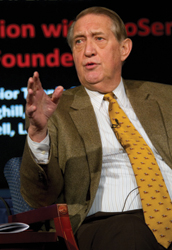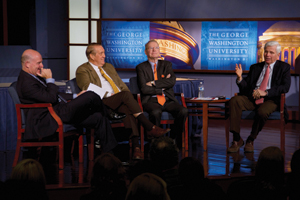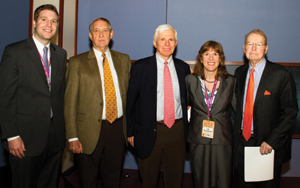Editor's note: This story is revised from the print edition.
Donald Dell remembers that the decision to launch one of the seminal sports marketing firms in U.S. history was simply about doing business. The ProServ co-founder said that he and his partners in a Washington, D.C., law firm had no choice but to launch the agency, which went on to produce many influential sports marketers and was the predecessor to today’s Octagon.
 |
SINC CONFERENCE
ProServ co-founder Donald Dell |
At that time in 1970, lawyers were restricted by a code of conduct that seems draconian by today’s standards: They couldn’t solicit business, they couldn’t recruit and they couldn’t advertise. With an interest in advancing the firm’s tennis business that started with
Arthur Ashe, Dell knew it couldn’t be done in the form of a law office.
“Basically, we couldn’t sell,” he said at a ProServ reunion held earlier this month at George Washington University in conjunction with the schools’ Sports Industry Networking and Career Conference. Since that prohibition was an impediment to sports marketing, the law offices of Dell, Craighill, Fentress & Benton gave birth to Professional Services Inc., quickly shortened to ProServ. The firm spawned a generation of sports leaders, and, in retrospect, offers a classic case study of a successful operation that couldn’t maintain the basis for its success — keeping its top people together.
Professional ethics aside, there were more practical reasons for the firm to solicit business under another name when it launched in 1970. “We learned that when we sent out a letter on legal stationery and were trying to sell something, it just didn’t work,” said Frank Craighill, after a series of panel discussions in Washington on the history of the agency, which was formed with the likes of Ashe and Stan Smith. “People didn’t know whether they were being sued or we were trying to get their legal business. ProServ rapidly proved itself as the better alternative for the business we wanted to build.”
ProServ largely built its business around professional tennis, and the agency grew to become the biggest rival of industry pioneer IMG. At its peak in the early 1980s, ProServ had 200-plus athletes under contract, including Michael Jordan, Denis Potvin, Dave Winfield and Jimmy Connors, before it split over personalities and various other factors.
Frank Craighill and Lee Fentress split to form Advantage International, which was purchased by IPG in 1997. It later combined with other sports agencies to form the basis for what is now Octagon, which, along with IMG, represent the two behemoths in sports marketing and management.
The Dell and Ray Benton-led ProServ was acquired in 1999 as part of the SFX Sports roll-up, a stock play that ultimately failed to produce solid sports marketing or the anticipated financial gains.
Aside from marketing athletes with the majesty of Jordan or the stature of Ashe, ProServ and its descendants can lay claim to pushing sports globally by working to formulate, and then negotiate, some of the first global rights deals around the FIFA World Cup and the first TOP Olympic deals.
“Give [Adidas president and ISL founder Horst] Dassler credit there, but he trusted us,” said Craighill, recalling signing the first TOP deal for Adidas in Seoul, South Korea, a few years before the 1988 Olympics. “A lot of people give Horst credit for getting the Olympics to South Korea. He did business in five languages and saw the global opportunities early because of his experience with international sports and business.”
 |
SINC CONFERENCE
From left: Gary Stevenson, Donald Dell, Frank Craighill and Ray Benton discuss the agency |
Former Advantage marketer Gary Stevenson, a George Washington MBA who moderated a panel with the founders, pointed to the three executives present, minus Lee Fentress, and said, “These are the guys who were the pioneers. They showed us, with the packaging of event and broadcast rights, what this industry could become.”
When the former Davis Cup captain Dell was a young adult, there was no future in pro tennis. “If you said you were a tennis player, the next question was always, what else do you do?” he said. “If I made $200 a week, I thought I was doing great. You were a tennis bum. Whereas the golfers were all respected. I got into it with that in mind.”
In the early-1970s, tennis became an open sport, boomed professionally around magnetic stars and took off at the grassroots level. Since IMG was built on the backs of legendary golfers Arnold Palmer, Jack Nicklaus and Gary Player during the 1960s, tennis had the potential to be a powerful differentiator as an undeveloped sport.
But in a case of what almost wasn’t, Dell told the story of taking Ashe to meet IMG founder Mark McCormack four times about representation, before Ashe suggested that Dell represent him. At first, Dell dismissed the idea. “At the time, I wanted to be the next Clarence Darrow,” he said, of his trial lawyer aspirations. But he reconsidered largely due to Ashe’s lobbying. Their first deal in 1970 was a five-year endorsement deal for Ashe with Head for $25,000 a year that included a 5 percent royalty on all Head rackets.
Ivan Blumberg, who started with ProServ in 1983, recalled a culture where results took precedence over billable hours. “These were competitive people who took their desire to compete on the court and brought it into the office,” said Blumberg, who served as general counsel and managing director of ProServ, and is now CEO of Athletes for Hope. “It didn’t matter what day it was. That office was full every Saturday.”
Sara Fornaciari came to ProServ after she couldn’t find work as a sportswriter. There were no female sportswriters then, so instead she became the first female sports attorney. Tracy Austin became her first client, and Fornaciari eventually served on the WTA board and was executive director of the WTA Players Association.
“There was a feeling we were building something at the ground floor and we all got to see this industry change radically during our careers,” she said. “We could do about 10 different jobs in a week: TV, marketing, operations, getting sponsors, legal and events. Today, it’s much more narrowly focused.”
With many first and second generation ProServ employees present, there was time to patch up and dissect the divorce that happened almost 28 years to the day of the GWU conference. For a time, it was like “The War of the Roses,” with ProServ and Advantage factions housed in the same downtown D.C. building, one floor beneath the other.
 |
SINC CONFERENCE
The conference’s Jeremy Silkowitz (left) and Lisa Delpy Neirotti with Dell, Benton and Craighill |
“Maybe it was meant to be that we would all leave and go out on our own,” said figure skating impresario Steve Disson, who worked at ProServ from 1976 to 1989. Disson told the story of waiting seven hours for a job interview with Dell, which eventually took place in a car speeding to catch a plane at Baltimore Washington International Airport. The offer to be the first MBA in a firm run by lawyers came the next day.
“To some degree, it became known as Donald Dell’s firm,” Dell said. “We did very well for 13 years, but maybe there was some resentment.”
During one of Meredith Geisler’s early days at Advantage, she was at the Landover, Md., home of Len Bias, fending off the media hordes that descended after the death of the Boston Celtics’ draft choice, who died from a cocaine overdose two days after being selected second overall in the 1983 NBA draft. Geisler remembers that she interviewed at both ProServ and Advantage, had offers from both, but chose the latter, where she stayed for 13 years. “They each had distinct personalities,” she recalled. “ProServ guys were brash and confident. Advantage was more comfortable and supportive. Since I was just out of school, I chose supportive.”
Of course, some were bittersweet in looking back. “Sure, there is some lamenting about what could have been,” said Jerry Solomon, who was at ProServ from 1980 to 1993, and now heads sports marketing, management and event firm StarGames. “This place was such a great springboard for the industry.”
IMG kept itself intact by founder McCormack’s intelligence, vision and personality. Perhaps it was impossible for ProServ to continue with four strong personalities at the top. “We all felt a strong loyalty to ProServ,” said Disson, who has worked for both ProServ and IMG. “IMG was always known as Mark McCormack’s company, and the loyalty was to him. That was the biggest difference.”
In talking to many about the company, it comes back to a familiar theme stated by one of Octagon’s most tenured employees, who requested anonymity in saying, “This is a story of a company that, at one point, just couldn’t hold on to all of its people.”






